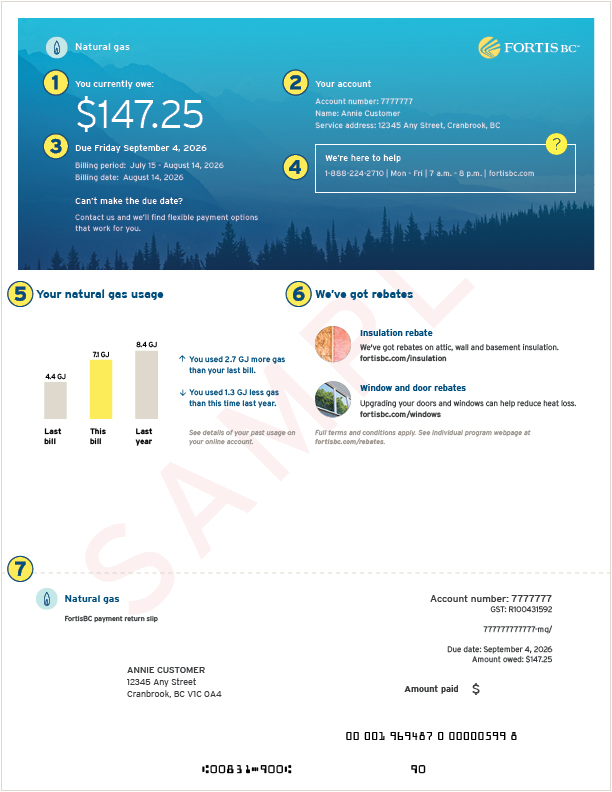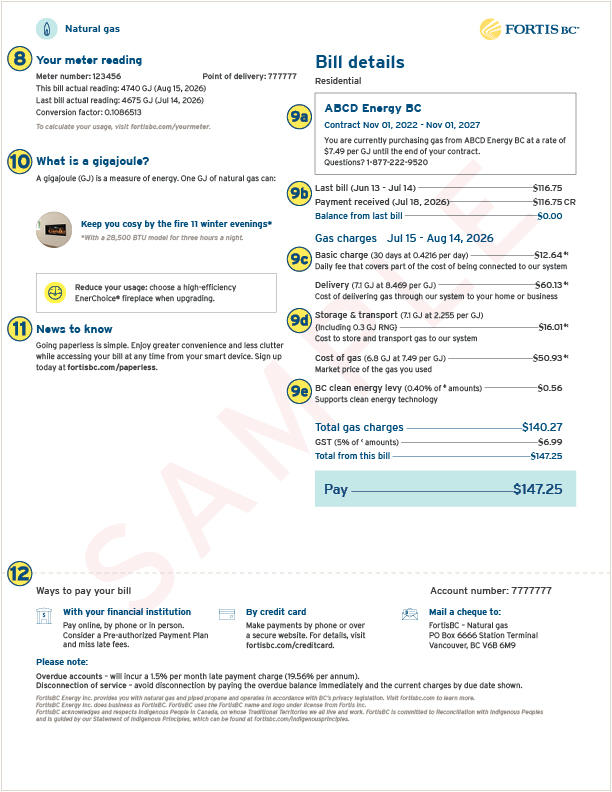Your Customer Choice natural gas bill
If you sign up for Customer Choice, your gas bill will still come from FortisBC because we still deliver your gas, even though you’re purchasing the gas from an independent gas marketer.
About Customer Choice gas billing and payment:
- You’ll continue making your bill payments to FortisBC.
- You can still take advantage of our various payment options including the Equal Payment Plan and the Pre-authorized Payment Plan.
- The commodity charge on your bill (the cost of gas per gigajoule [GJ]) will be different than if you’re purchasing gas from FortisBC.
- All other charges on your bill from FortisBC (basic charge, delivery and storage and transport charges) will remain the same and be charged to all FortisBC and Customer Choice customers.
Sample of a Customer Choice gas bill
Note: this is only a sample bill and may not reflect current gas rates.


Note: this is only a sample bill and may not reflect current gas rates.
Signed up for paperless billing? It’s a good idea to check your spam or junk email folder once in a while to ensure important emails, like your bill, don’t get missed.
1. Amount/payment due/amount to be withdrawn
This is the balance outstanding on your account from your last bill plus new charges. If the balance shown is a credit, you’ll also see a “Do not pay” alert on your bill.
2. Your account
This section includes your account number, the name your account is in and the address where you are receiving gas service.
3. Billing dates
- Billing due date is the date your next payment is due.
- Billing period is the period of time in which charges are billed to your account.
- Billing date is the date your bill was issued. Transactions after this date will appear on your next bill.
4. Our contact information
We’re here to help. If you have questions about your bill, call us at 1-888-224-2710, Monday to Friday, 7 a.m. to 8 p.m., or visit fortisbc.com.
What’s a gigajoule? A gigajoule (GJ) is a measure of energy used to measure your gas consumption. One GJ is roughly the amount of energy needed to heat a typical house for one day.1 You pay for the gas you consume, measured in GJ.
5. Your natural gas usage
This graph shows you, at a glance, if you’ve used more or less energy than usual. It shows how many GJs of gas you’ve used over the billing period and compares it to what you used during the last billing period and the same time the last year. Knowing if you’ve used less, more or the same amount of gas as other time periods can help you track your energy usage and make choices that could help lower your energy use and overall emissions and save on your monthly bills.
6. Energy-saving tips/rebate offers
Every bill you’ll see either a set of energy-savings tips or information about our rebates on high-efficiency heating equipment and products. This information could help you lower your energy use and overall emissions and save money on your energy bills.
7. Payment return slip
This slip lists your account number, your GST number, bill due date and total amount due. If you receive a paper bill and either mail your payment or pay in person at your financial institution, please include the return slip.
8. Your meter reading
This lists your meter number and how much gas you’ve used over the billing period. It shows your current meter reading and subtracts your previous meter reading. The volume is multiplied by a conversion factor that accounts for your location’s standard conditions of temperature and pressure to give your gas usage in GJ.
Estimated or pro-rated bills
Occasionally, we’re unable to secure a reading on the scheduled date. If this happens, we will estimate your bill based on your past energy use. The next actual meter reading will adjust for any over or underestimate.
If the period between your meter readings is shorter or longer than usual (as is often the case when you connect a new service or disconnect your service) your bill will be pro-rated. Charges will be adjusted to reflect the length of the service period.
9a. Gas marketer contact information
Listed here you’ll find the:
- name of the independent gas marketer you signed a Consumer Agreement with
- length and end date of the contract you signed with them
- rate you are paying (per GJ) for the cost of gas
- phone number of the gas marketer if you have questions about the cost of gas on your bill or anything related to your contract with the gas marketer
9b. Your last bill
- Last bill is the amount due on your last bill.
- Payment received is the last payment amount we received from you.
- Balance from last bill shows the amount owing, if any, from your previous bill and any payments or adjustments since we issued your last bill.
9c. Basic charge/delivery charge
- Basic charge is a flat daily fee that partially recovers the fixed costs of our system because you are connected to it, whether you’re using gas or not.
- Delivery charge is based on consumption and is the cost of delivering gas through our system to your home or business.
Together, the basic and delivery charges help cover the costs of maintaining the system. This is also where we make a modest profit and where we invest in our business and improvements to meet your energy needs. These charges are reviewed by the British Columbia Utilities Commission (BCUC) annually.
9d. Storage and transport/cost of gas
- Storage and transport is what we pay to other companies to store and transport gas through their pipelines and infrastructure. These costs are reviewed by the BCUC annually.
- Cost of gas is the price charged by your third-party gas marketer for the gas you used.
- As of July 1, 2025, most FortisBC and Customer Choice gas customers will have three per cent of their natural gas designated as Renewable Natural Gas2, known as designated RNG blend.
9e. Other charges and taxes
Other charges and taxes you may see on your bill are set by various levels of government. We collect them on their behalf and don’t gain any revenue from these taxes and fees, which include:
- B.C. clean energy levy, or the Innovative Clean Energy Fund levy, was introduced by the provincial government to support investment in clean energy technology. The levy is 0.4 per cent of the purchase price on residential and commercial energy purchases of natural gas and propane. The levy does not apply to residential and commercial purchases of electricity.
- GST (Goods and Service Tax) or PST (Provincial Sales Tax). We collect GST on behalf of the federal government and PST on behalf of the provincial government.
Have questions about GST or PST? - For small businesses and stratas: 1-888-224-2710, Monday-Friday, 7 a.m. to 8 p.m.
- For large commercial and industrial: 1-855-873-8773, Monday-Friday, 8 a.m. to 4 p.m.
Note: in certain cases, some customers may see different fees and charges on their bill including:
- Municipal operating fee is a levy FortisBC collects on behalf of some municipalities. This fee gets passed on to the district, municipality, city, town or village you live in. It may appear as a fee on monthly charges, excluding tax. When an operating fee is in place, the BCUC has approved the fee. It doesn’t result in additional revenue for us. For questions about operating fees in your area, contact your local government.
- Motor fuel tax applies to propane business customers only in Revelstoke, B.C.
10. Gas facts
On every bill you’ll see an interesting gas fact that will help you understand what a GJ of natural gas is equivalent to—like heating enough water for 95 hot showers.3 You’ll also get a corresponding tip to help you reduce your energy use.
11. News to know
On most bills you’ll get some news from us that we hope you’ll find valuable. It could be information about a new rebate or a reminder about how to stay safe around our energy infrastructure.
12. Ways to pay your bill
Find out about the different ways to pay your bill including by credit card, cheque or through your financial institution.
See what a FortisBC gas bill looks like.
1One GJ of gas can heat a typical 2,000 square foot home for one day with a 120,000 BTU furnace running eight hours.
2Renewable Natural Gas (also called RNG or biomethane) is produced in a different manner than conventional natural gas. It is derived from biogas, which is produced from decomposing organic waste from landfills, agricultural
waste and wastewater from treatment facilities. The biogas is captured and cleaned to create RNG. When RNG is added to North America’s natural gas system, it mixes with conventional natural gas. This means we’re unable to direct RNG
to a specific customer. But the more RNG is added to the gas system, the less conventional natural gas is needed, thereby reducing the use of fossil fuels and overall greenhouse gas emissions.
3One GJ of gas can heat enough
water for 95 hot showers based on a five-minute shower using a 9.5 litres per minute showerhead.